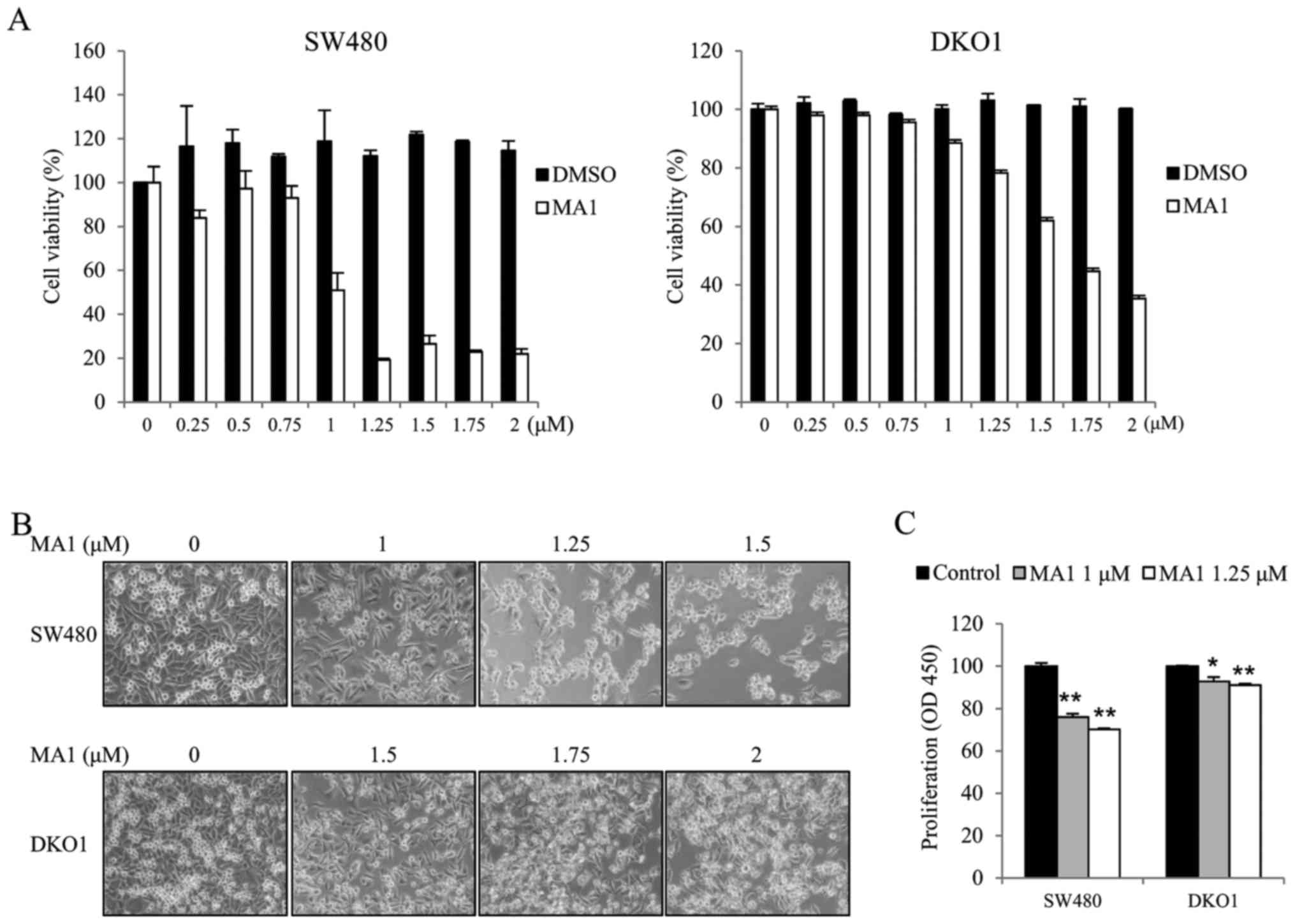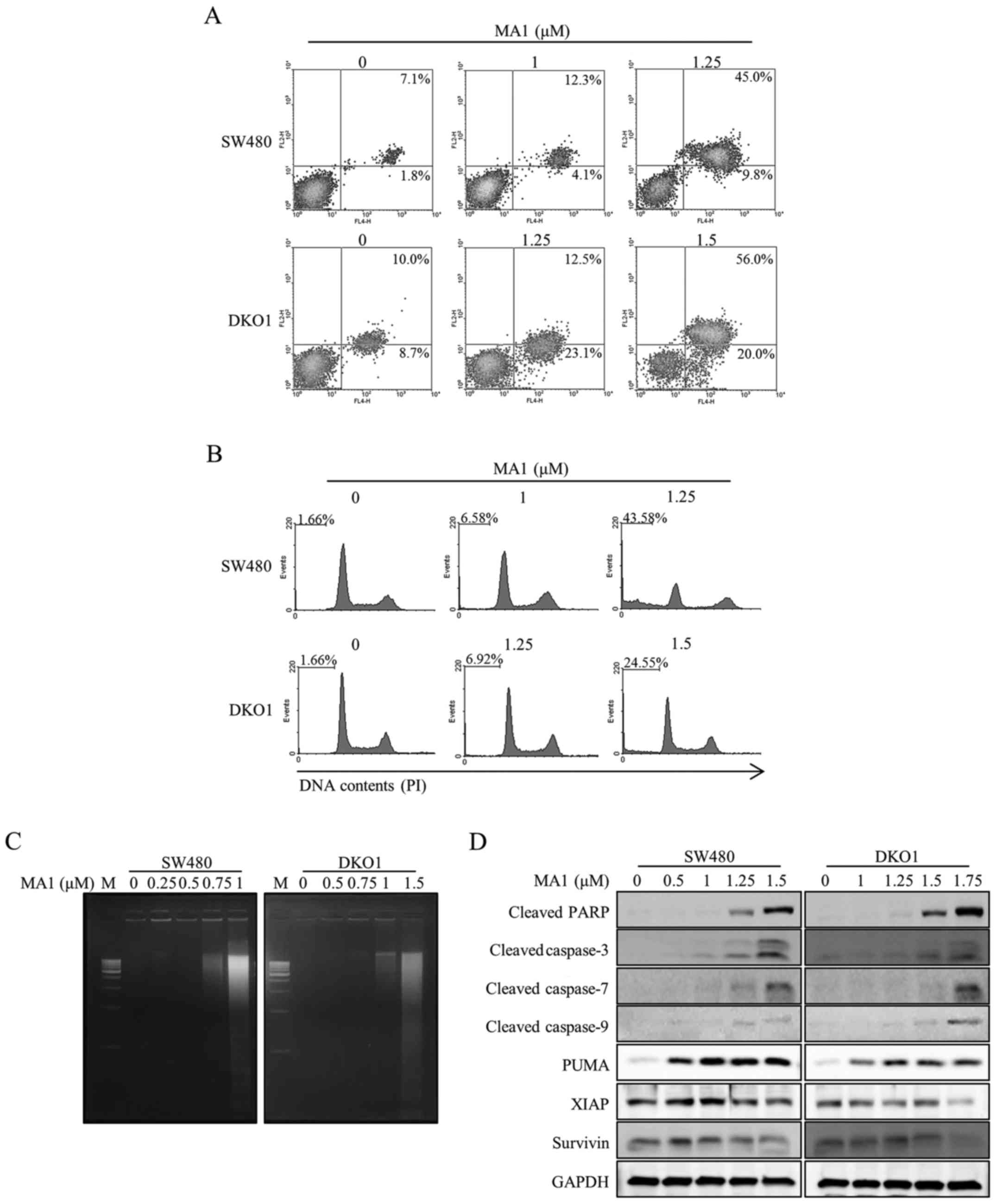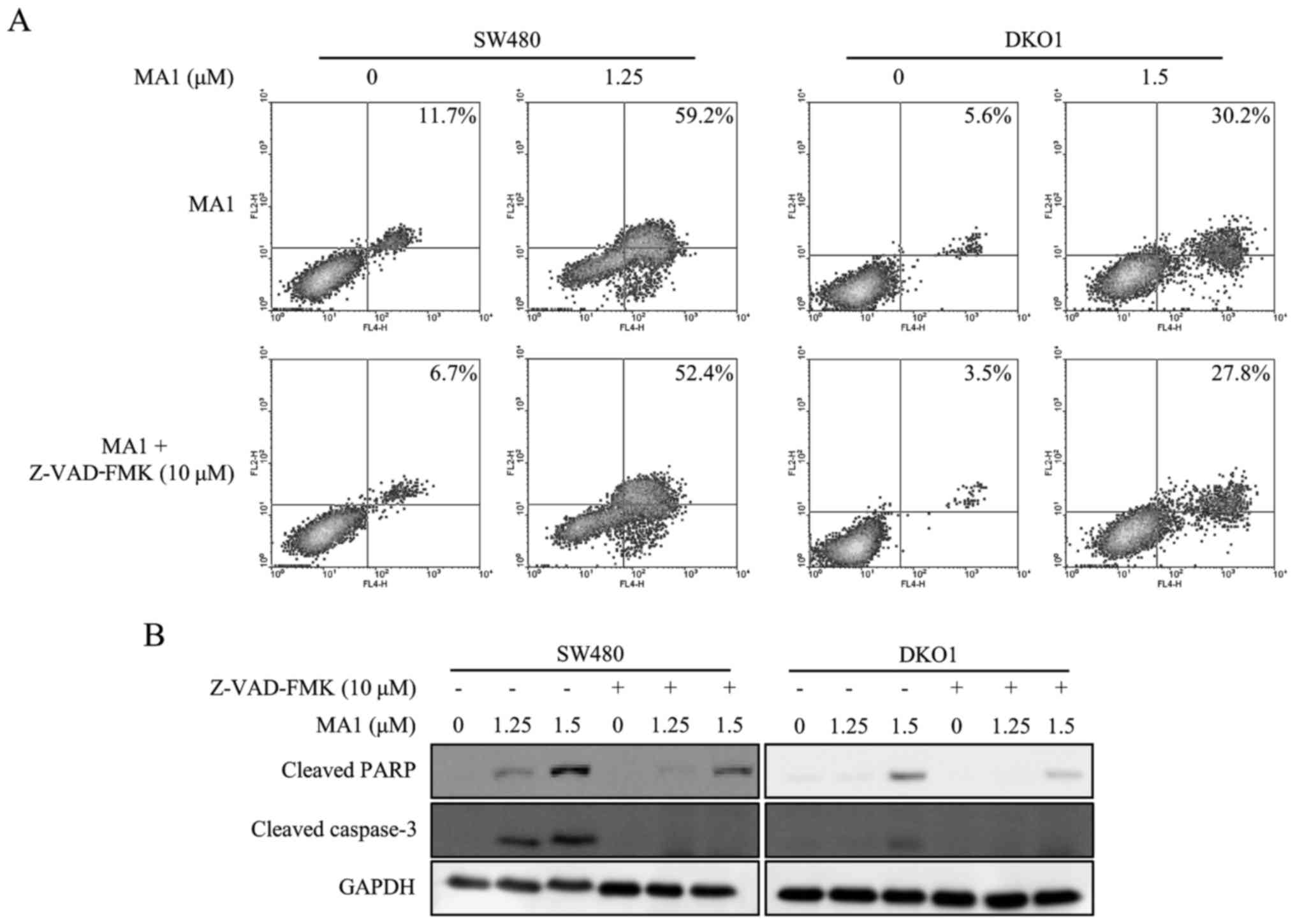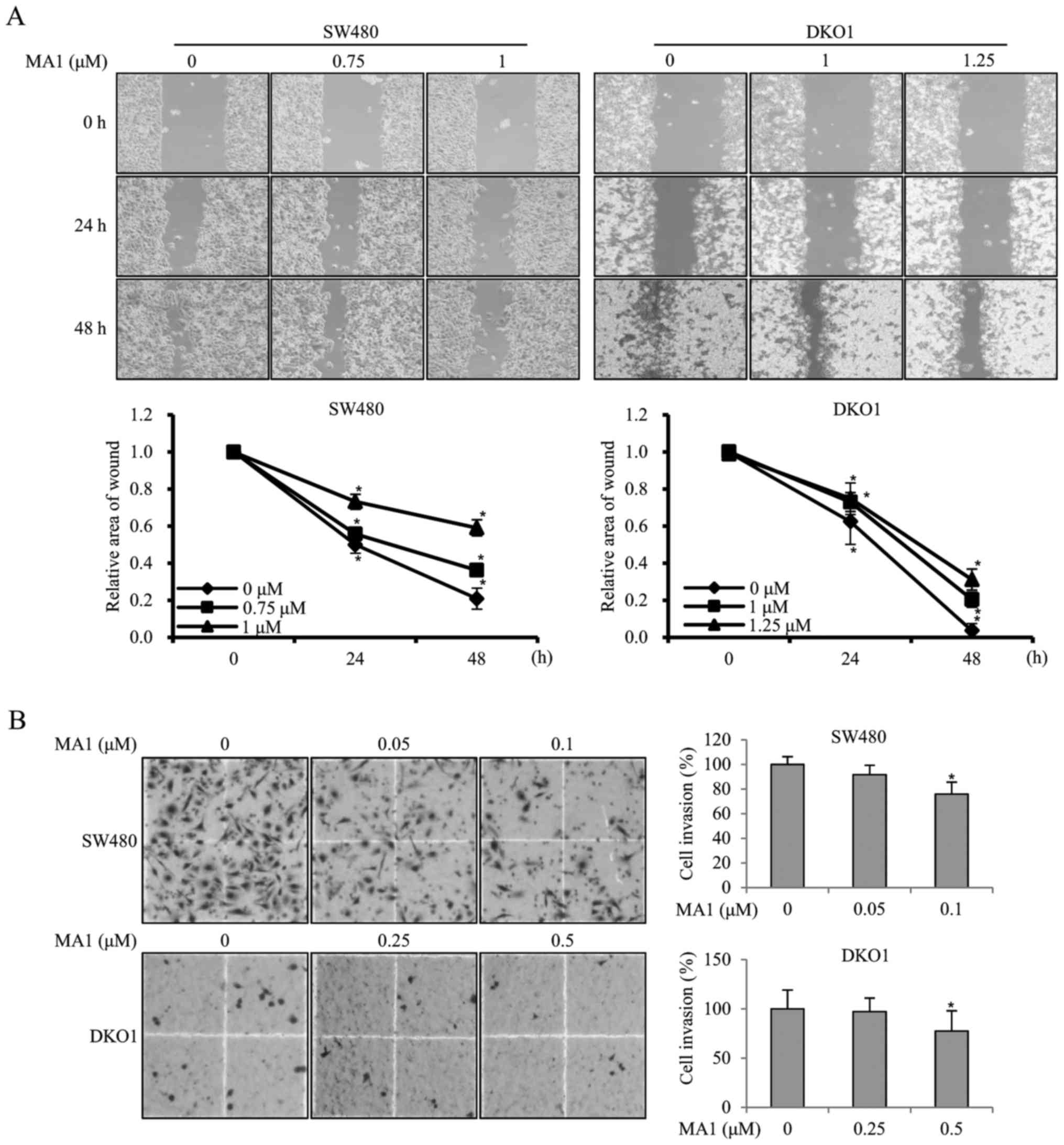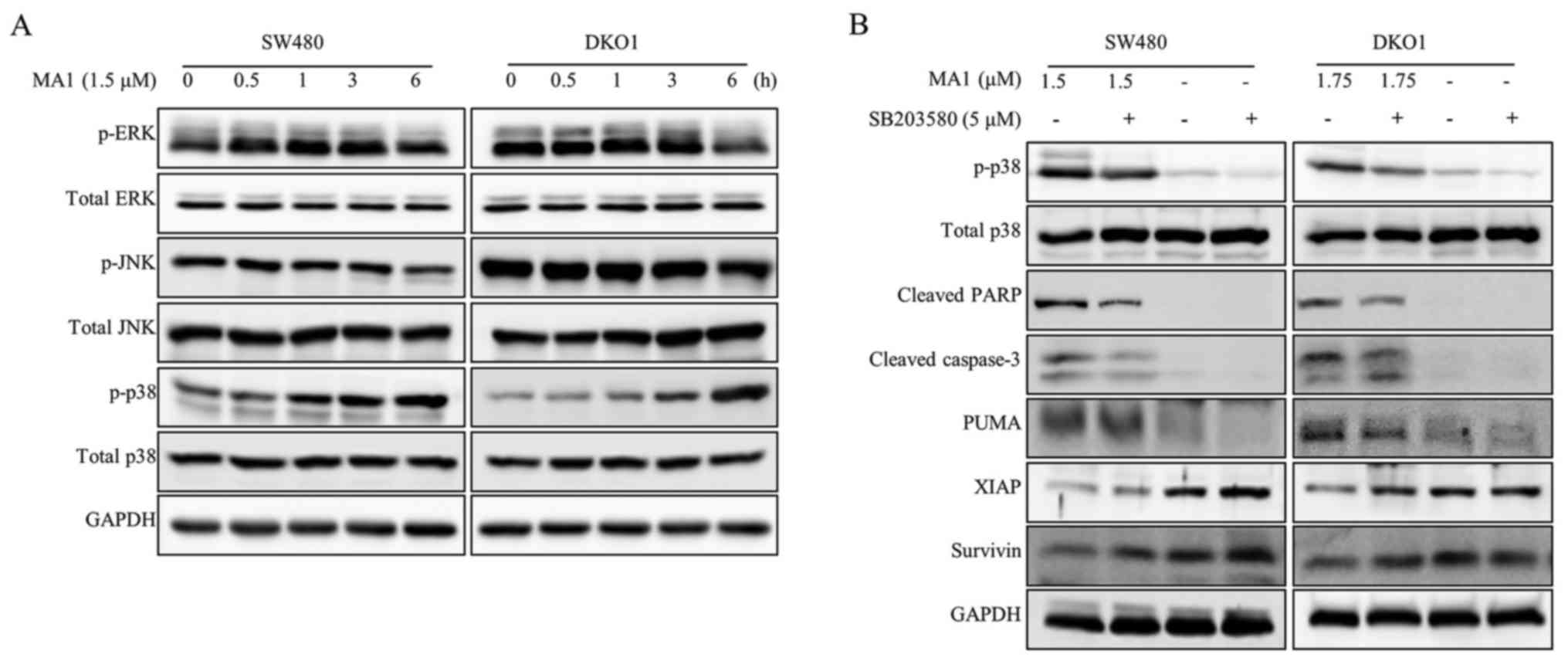|
1
|
Kim ER and Kim YH: Clinical application of
genetics in management of colorectal cancer. Intest Res.
12:184–193. 2014. View Article : Google Scholar : PubMed/NCBI
|
|
2
|
Park SH, Song CW, Kim YB, Kim YS, Chun HR,
Lee JH, Seol WJ, Yoon HS, Lee MK, Bhang CS, et al:
Clinicopathological characteristics of colon cancer diagnosed at
primary health care institutions. Intest Res. 12:131–138. 2014.
View Article : Google Scholar : PubMed/NCBI
|
|
3
|
Lin OS, Kozarek RA and Cha JM: Impact of
sigmoidoscopy and colonoscopy on colorectal cancer incidence and
mortality: An evidence-based review of published prospective and
retrospective studies. Lancet. 383:1490–1502. 2014.
|
|
4
|
Gunatilaka AAL: Natural products from
plant-associated microorganisms: Distribution, structural
diversity, bioactivity, and implications of their occurrence. J Nat
Prod. 69:509–526. 2006. View Article : Google Scholar : PubMed/NCBI
|
|
5
|
Schulz B, Boyle C, Draeger S, Römmert AK
and Krohn K: Endophytic fungi: A source of novel biologically
active secondary metabolites. Mycol Res. 106:996–1004. 2002.
View Article : Google Scholar
|
|
6
|
Strobel G, Daisy B, Castillo U and Harper
J: Natural products from endophytic microorganisms. J Nat Prod.
67:257–268. 2004. View Article : Google Scholar : PubMed/NCBI
|
|
7
|
Tan RX and Zou WX: Endophytes: A rich
source of functional metabolites. Nat Prod Rep. 18:448–459. 2001.
View Article : Google Scholar : PubMed/NCBI
|
|
8
|
Chomcheon P, Wiyakrutta S, Sriubolmas N,
Ngamrojanavanich N, Isarangkul D and Kittakoop P: 3-Nitropropionic
acid (3-NPA), a potent antimycobacterial agent from endophytic
fungi: Is 3-NPA in some plants produced by endophytes? J Nat Prod.
68:1103–1105. 2005. View Article : Google Scholar : PubMed/NCBI
|
|
9
|
Li XB, Xie F, Liu SS, Li Y, Zhou JC, Liu
YQ, Yuan HQ and Lou HX: Naphtho-γ-pyrones from Endophyte
Aspergillus niger occurring in the liverwort Heteroscyphus tener
(Steph.) Schiffn. Chem Biodivers. 10:1193–1201. 2013. View Article : Google Scholar : PubMed/NCBI
|
|
10
|
Curtis RW, Stevenson WR and Tuite J:
Malformin in Aspergillus niger-infected onion bulbs (Allium cepa).
Appl Microbiol. 28:362–365. 1974.PubMed/NCBI
|
|
11
|
Kim KW, Sugawara F, Yoshida S, Murofushi
N, Takahashi N and Curtis RW: Structure of malformin B, a
phytotoxic metabolite produced by Aspergillus niger. Biosci
Biotechnol Biochem. 57:787–791. 1993. View Article : Google Scholar : PubMed/NCBI
|
|
12
|
Kim KW, Sugawara F, Yoshida S, Murofushi
N, Takahashi N and Curtis RW: Structure of Malformin A, a
phytotoxic metabolite produced by Aspergillus niger. Biosci
Biotechnol Biochem. 57:240–243. 1993. View Article : Google Scholar : PubMed/NCBI
|
|
13
|
Ma YM, Liang XA, Zhang HC and Liu R:
Cytotoxic and antibiotic cyclic pentapeptide from an endophytic
Aspergillus tamarii of Ficus carica. J Agric Food Chem.
64:3789–3793. 2016. View Article : Google Scholar : PubMed/NCBI
|
|
14
|
Zhou X, Fang W, Tan S, Lin X, Xun T, Yang
B, Liu S and Liu Y: Aspernigrins with anti-HIV-1 activities from
the marine-derived fungus Aspergillus niger SCSIO Jcsw6F30. Bioorg
Med Chem Lett. 26:361–365. 2016. View Article : Google Scholar
|
|
15
|
Tan QW, Gao FL, Wang FR and Chen QJ:
Anti-TMV activity of malformin A1, a cyclic penta-peptide produced
by an endophytic fungus Aspergillus tubingensis FJBJ11. Int J Mol
Sci. 16:5750–5761. 2015. View Article : Google Scholar : PubMed/NCBI
|
|
16
|
Koizumi Y, Nagai K, Hasumi K, Kuba K and
Sugiyama T: Structure-activity relationship of cyclic pentapeptide
malformins as fibrinolysis enhancers. Bioorg Med Chem Lett.
26:5267–5271. 2016. View Article : Google Scholar : PubMed/NCBI
|
|
17
|
Koizumi Y, Fukudome H and Hasumi K:
Fibrinolytic activation promoted by the cyclopentapeptide
malformin: Involvement of cytoskeletal reorganization. Biol Pharm
Bull. 34:1426–1431. 2011. View Article : Google Scholar : PubMed/NCBI
|
|
18
|
Koizumi Y and Hasumi K: Enhancement of
fibrinolytic activity of U937 cells by malformin A1. J Antibiot
(Tokyo). 55:78–82. 2002. View Article : Google Scholar
|
|
19
|
Herbert JM, Savi P, Lalé A, Laplace MC,
Baudry N, Pereillo JM and Emonds-Alt X: Malformin-A1 inhibits the
binding of interleukin-1 beta (IL1 beta) and suppresses the
expression of tissue factor in human endothelial cells and
monocytes. Biochem Pharmacol. 48:1211–1217. 1994. View Article : Google Scholar : PubMed/NCBI
|
|
20
|
Bannon PG, Dawes J and Dean RT: Malformin
A prevents IL-1 induced endothelial changes by inhibition of
protein synthesis. Thromb Haemost. 72:482–483. 1994.PubMed/NCBI
|
|
21
|
Kojima Y, Sunazuka T, Nagai K, Julfakyan
K, Fukuda T, Tomoda H and Omura S: Total synthesis of malformin C,
an inhibitor of bleomycin-induced G2 arrest. J Antibiot (Tokyo).
61:297–302. 2008. View Article : Google Scholar
|
|
22
|
Hagimori K, Fukuda T, Hasegawa Y, Omura S
and Tomoda H: Fungal malformins inhibit bleomycin-induced G2
checkpoint in Jurkat cells. Biol Pharm Bull. 30:1379–1383. 2007.
View Article : Google Scholar : PubMed/NCBI
|
|
23
|
Zhan J, Gunaherath GM, Wijeratne EM and
Gunatilaka AA: Asperpyrone D and other metabolites of the
plant-associated fungal strain Aspergillus tubingensis.
Phytochemistry. 68:368–372. 2007. View Article : Google Scholar
|
|
24
|
Liu Y, Wang M, Wang D, Li X, Wang W, Lou H
and Yuan H: Malformin A1 promotes cell death through induction of
apoptosis, necrosis and autophagy in prostate cancer cells. Cancer
Chemother Pharmacol. 77:63–75. 2016. View Article : Google Scholar
|
|
25
|
Chambers AF, Groom AC and MacDonald IC:
Dissemination and growth of cancer cells in metastatic sites. Nat
Rev Cancer. 2:563–572. 2002. View
Article : Google Scholar : PubMed/NCBI
|
|
26
|
Brábek J, Mierke CT, Rösel D, Veselý P and
Fabry B: The role of the tissue microenvironment in the regulation
of cancer cell motility and invasion. Cell Commun Signal. 8:222010.
View Article : Google Scholar : PubMed/NCBI
|
|
27
|
Kiechle FL and Zhang X: Apoptosis:
Biochemical aspects and clinical implications. Clin Chim Acta.
326:27–45. 2002. View Article : Google Scholar : PubMed/NCBI
|
|
28
|
Thompson CB: Apoptosis in the pathogenesis
and treatment of disease. Science. 267:1456–1462. 1995. View Article : Google Scholar : PubMed/NCBI
|
|
29
|
Cargnello M and Roux PP: Activation and
function of the MAPKs and their substrates, the MAPK-activated
protein kinases. Microbiol Mol Biol Rev. 75:50–83. 2011. View Article : Google Scholar : PubMed/NCBI
|
|
30
|
Haagenson KK and Wu GS: Mitogen activated
protein kinase phosphatases and cancer. Cancer Biol Ther.
9:337–340. 2010. View Article : Google Scholar : PubMed/NCBI
|
|
31
|
Pang H, Cai L, Yang Y, Chen X, Sui G and
Zhao C: Knockdown of osteopontin chemosensitizes MDA-MB-231 cells
to cyclophosphamide by enhancing apoptosis through activating p38
MAPK pathway. Cancer Biother Radiopharm. 26:165–173. 2011.
View Article : Google Scholar : PubMed/NCBI
|
|
32
|
Chiu SJ, Chao JI, Lee YJ and Hsu TS:
Regulation of gamma-H2AX and securin contribute to apoptosis by
oxaliplatin via a p38 mitogen-activated protein kinase-dependent
pathway in human colorectal cancer cells. Toxicol Lett. 179:63–70.
2008. View Article : Google Scholar : PubMed/NCBI
|















